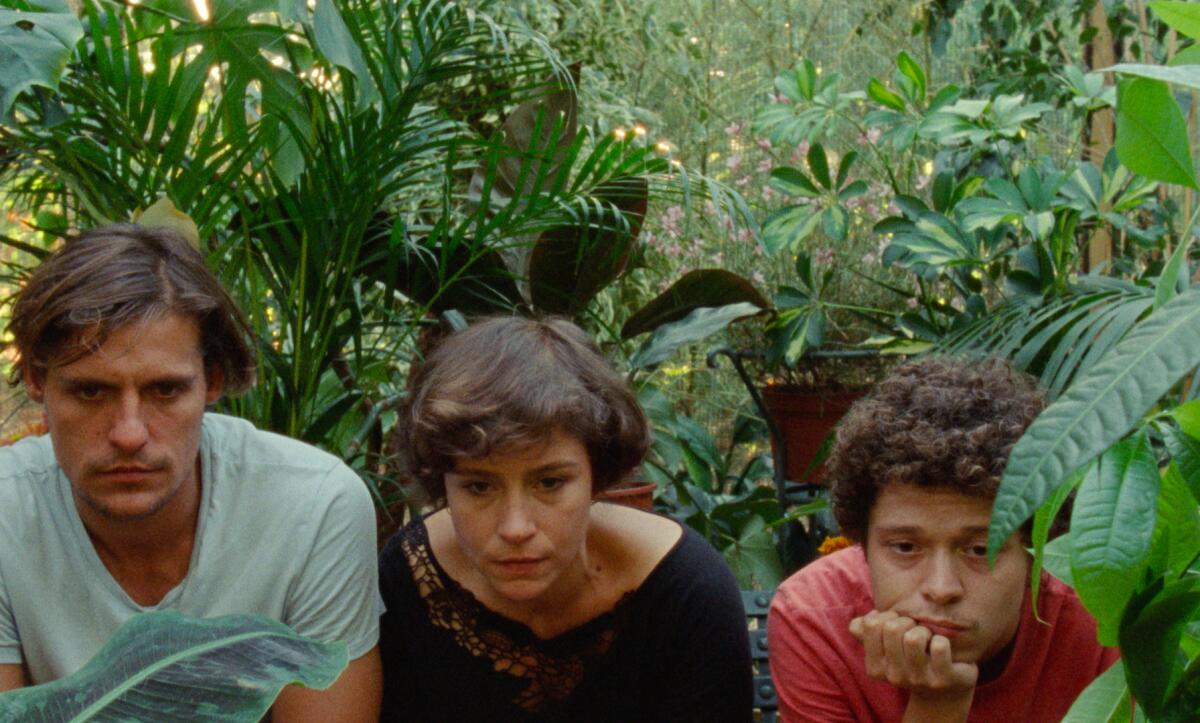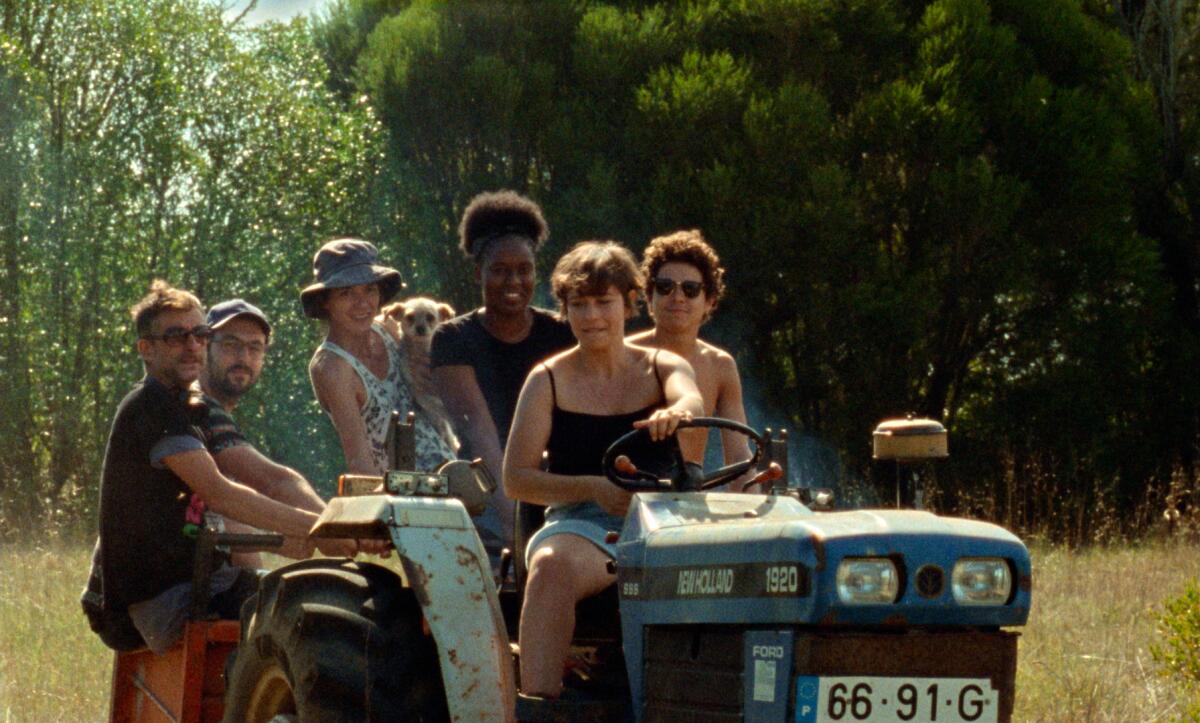Review: Unfolding in reverse, ‘The Tsugua Diaries’ might be 2022’s most glorious summer movie

- Share via
In one of the loveliest sequences in “The Tsugua Diaries,” a sly, summery delight from Portugal, two men and a woman raise a series of wooden beams. As they work together — patiently, intuitively, almost wordlessly — the structure they’re building gradually takes shape, and so, piece by piece, does this wondrously playful and mysterious movie. At one point midscene, the woman cautiously turns her head away from one of the men, who has a bandana wrapped around his face. You’ll recognize the gesture; maybe you’ve done it yourself over the last few years, one of countless little coping measures during a time of infrequent togetherness and prolonged isolation.
Directed by the Lisbon-based filmmakers Maureen Fazendeiro and Miguel Gomes (who co-wrote the script with Mariana Ricardo), “The Tsugua Diaries” is a pandemic-lockdown movie about a pandemic-lockdown movie. It was shot on a Portuguese farm between August and September 2020, and it tells the story of a film production operating under the same low-budget, protocol-heavy circumstances. The woman, Crista Alfaiate, and the men, Carloto Cotta and João Nunes Monteiro, are actors playing actors. The farm is an open-air set, as well as a set-within-a-set. As we watch these three build a butterfly house, splash around in a pool and dance to the infectious beat of Frankie Valli and the Four Seasons’ “The Night,” you may wonder: Are we seeing the movie they’re making, or their behind-the-scenes preparations for said movie? Is this art, life or a sun-kissed patchwork of both?
For your safety
The Times is committed to reviewing theatrical film releases during the COVID-19 pandemic. Because moviegoing carries risks during this time, we remind readers to follow health and safety guidelines as outlined by the CDC and local health officials.
The movie — as opposed to the movie-within-a-movie — is structured in a way that complicates rather than answers these questions. “Tsugua” is simply “August” spelled backward, and “The Tsugua Diaries” itself unspools in reverse; it begins on Day 22 and ends on Day 1, and each scene is motivated and explained, more or less, by the one that comes after it (which is to say, before it). Imagine an achronological remake of François Truffaut’s 1973 classic, “Day for Night,” in which a character famously likens the filmmaking process to “a stagecoach ride in the Old West. When you start, you are hoping for a pleasant trip. By the halfway point, you just hope to survive.”
That’s more or less where the characters find themselves by the halfway point of “The Tsugua Diaries,” although because the story is unfolding backwards, that’s also roughly the point where, from an audience perspective, things really start to get interesting. The pleasurable late-summer idyll of the first half, disrupted by occasional ripples of tension and jealousy, gives way to a curious mix of chaos and tedium. More or less alone at first, Crista, Carloto and João are suddenly surrounded by the members of their film crew, including directors Fazendeiro and Gomes, who appear as (versions of) themselves. Where did they all come from? (Or rather, where do they end up going?) Does Day 22 mark the moment when the project came triumphantly together, or when it finally fell apart?
In any event, at some point along the way, this low-budget production, vaguely scripted to begin with, has become a full-on improvisatory exercise. The actors, granted complete control over the writing and direction of their scenes, struggle with production logistics, narrative priorities and character motivations. Tensions loom and setbacks abound, pandemic restrictions not least among them: A meeting is held to address the fallout of one actor’s reckless protocol violation — which doesn’t happen, of course, until after the meeting. But like every setback, even protocols are shown to have their creative possibilities.

The head spins, but the structure coheres. You see the actors splashing in that pool, and you also see them working alongside the crew to clean it out several days earlier. You see people piled aboard a tractor, blissfully riding across the grounds, and you also see the throwaway discussion that gave rise to that scene. You come to appreciate anew that every movie moment is the product of countless hard decisions, many of them made on the fly, and considerable group effort. You might also be reminded, as I was, of the temporal discombobulation induced by the pandemic, the sense of time and existence being turned on their heads.
“The Tsugua Diaries” is the feature debut of the French-born Fazendeiro and the latest effort from Gomes, a much-admired figure on the international festival circuit for the dreamily beautiful “Tabu” and “Arabian Nights,” his six-hour trilogy about the grim fate of Portugal in an era of European austerity. Considerably looser and lighter, this latest effort works as a companion to Gomes’ wonderful “Our Beloved Month of August” (2008), which operated similarly within the parameters of a film-within-a-film conceit.
It’s great fun to puzzle over “Tsugua’s” structure, to look for formal and structural clues and to figure out how Day 17 snaps into Day 16. But there may even more pleasure in simply surrendering to the movie’s warm, sunny vibes, from its images of gently flapping butterflies and dense green overgrowth (shot on 16 millimeter by Mário Castanheira) to the woozily gorgeous strains of Norberto Lobo’s “Legionella.” This is a lyrical ode to the glories of summer and the collaborative joys of filmmaking, suffused with the hope that we will never be deprived of either for long.
'The Tsugua Diaries'
(Not rated)
(In Portuguese with English subtitles)
Running time: 1 hour, 42 minutes
Playing: Laemmle Monica Film Center, Santa Monica
More to Read
Only good movies
Get the Indie Focus newsletter, Mark Olsen's weekly guide to the world of cinema.
You may occasionally receive promotional content from the Los Angeles Times.











